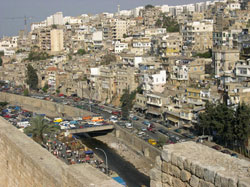Water Management for Tripoli, Lebanon
The SMART project's results have an impact on three different levels: social and administrative, scientific and knowledge dissemination, and economic. At the social-administrative level, information was provided to local communities regarding possible improvements to the water infrastructure. The issue of water pricing as a way of controlling demand, was also discussed. The project team worked alongside the water authorities who investigated the use of an integrated approach for water management and their projected privatisation process. The most innovative aspect to this approach was the integration of all water users on the one hand and a holistic water catchment area approach on the other. At the scientific level the results were very encouraging. A digital database was developed for the catchment area and made available on the server of the GIS-based bureau of the Municipality of Tripoli. This supplies available information to the different local communities of the area. Knowledge gained by the research team using advanced water management software has proved invaluable. It has added a new dimension to both research and its application. Collaborations with fellow scientists from Lebanese universities have proven to be extremely productive. Some partners were concerned with the outcomes from a water resource management viewpoint, while others were more concerned with the aspect of water quality. This applied both to freshwater on land (using Water Ware), as well as the littoral zone (using Telemac software). This additional information has been used to publish some of the work in scientific journals and at meetings, contributing knowledge to the wider scientific community. Improvements in water management at the social-administrative level have also had economic benefits. This includes better control of leaks and the encouragement of positive interactions among different stakeholders. It has also contributed to the acceptance of possible regulations for water pricing. The current system results in high levels of water wastage. Therefore, the economic benefits are considerable if data generated by the SMART project approach are used. The water authorities should be made aware of the value of applying such techniques.



